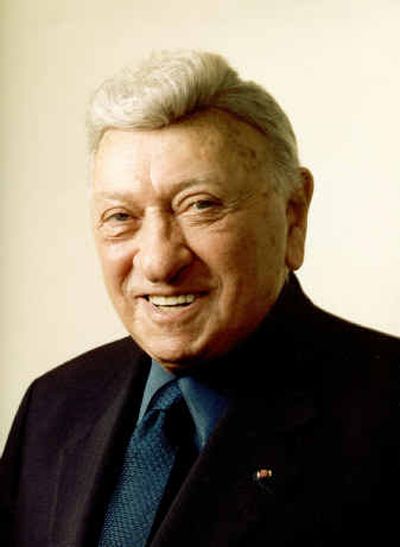Unorthodox foreign language instructor who taught stars dies

Michel Thomas, a linguist whose rapid-learning method for teaching foreign languages attracted some of Hollywood’s most glamorous names, has died. He was 90.
Thomas, who last July was awarded the Silver Star for bravery in action during World War II, died Saturday night of heart failure at his New York home, his publicist, Bruce Bobbins, told the Associated Press.
Thomas, who said he spoke 11 languages, arrived in the United States soon after World War II. He moved to Beverly Hills, Calif., and built a reputation as an unorthodox but successful teacher of foreign language.
Saying that he could teach basic command of a language in a matter of days or a week, he attracted a who’s who of Hollywood clients over the years including Barbra Streisand, Mel Brooks, Alfred Hitchcock, Woody Allen, Bill Murray and Warren Beatty.
The linguist went on to open the Michel Thomas Language Centers in New York and Beverly Hills and attracted corporate clients including Coca-Cola, Procter & Gamble and American Express.
Thomas based his method on the commonality of Western languages. According to an article in Contemporary Newsmakers, Thomas “starts out by reminding the student that French and English have some 7,000 cognates – shared words that are pronounced differently. All that remains is to learn how to say the words properly.”
“English is French, badly pronounced,” he joked to the New York Daily News some years ago.
In his method, Thomas told a Los Angeles Times reporter in September 1975, “the ground rule is never to worry about remembering.”
He urged his students to “relax and be comfortable. It is most important to begin with a relaxed attitude and to eliminate any and all forms of tension.”
The Times story reported that Thomas told his students not to try to memorize, but to listen.
“When the student learns to listen, he is receptive,” Thomas said. “The anxieties of learning should be taken away. Most are learning another language and are frightened of the grammar, the pronunciation.”
He took his learning program into the traditional classroom, teaching junior high school and high school students. His methods, however, were not widely accepted by the educational establishment in the United States. But in 1982, he was awarded the gold medal for outstanding achievement in education and teaching by the Academie Francaise.
Thomas himself was an enigmatic figure who over the years recounted a number of astonishing exploits during World War II.
Last year, he was awarded the Silver Star, supported by Sen. John McCain, R-Ariz., and Rep. Carolyn Maloney, D-N.Y. The citation that accompanied his Silver Star stated that he fought with American troops as an attached member of the Army’s 45th Infantry Division. The medal was given to Thomas for his bravery in leading patrols in enemy territory.
The son of a textile factory owner, Thomas was born Moniek Kroskof in Lodz, Poland, on Feb. 3, 1914. Michel Thomas was one of several aliases he used during the war.
According to a biography on his Web site, he left Poland as a child to live with his aunt in Breslau, Germany, graduated from the University of Bordeaux and went to Austria to study psychology at the University of Vienna. He was caught in the German occupation, however, and his passport was confiscated. He left Austria a stateless Jew and found his way to France. During the war, the official biography states, he volunteered for the French Army and served in the intelligence corps in Nice.
After the fall of France, he said, he was arrested several times. A biography of Thomas titled “Test of Courage: The Michel Thomas Story” (1999) by Christopher Robbins, which was completed with Thomas’ cooperation, stated that Thomas was interrogated by Klaus Barbie, nicknamed the “Butcher of Lyon,” in 1943 but was spared a trip to the Auschwitz death camp by pretending that he did not speak German.
According to his Web site biography, Thomas was a U.S. counterintelligence agent toward the end of the war, was present at the liberation of Dachau and began collecting data on Nazi war criminals. The biography said Thomas infiltrated a group of Nazis who were planning a terrorist campaign and brought the leaders to U.S. Army justice in Germany.
Some of Thomas’ claims repeated in Robbins’ book and on his own Web site have been difficult to verify. Those discrepancies were outlined in an April 2001 article in the Times.
Thomas sued the newspaper for defamation for that story, saying the article implied that he had fabricated or exaggerated accounts of his life. A federal judge dismissed the lawsuit in February 2002, and the 9th U.S. Circuit Court of Appeals affirmed that ruling. Thomas petitioned the U.S. Supreme Court to hear the case, but the court refused.